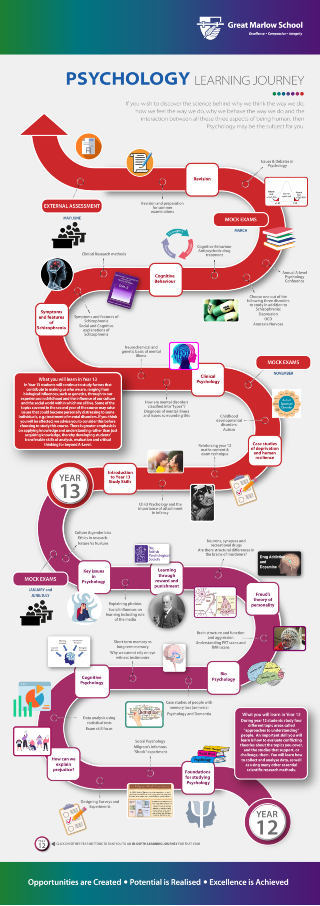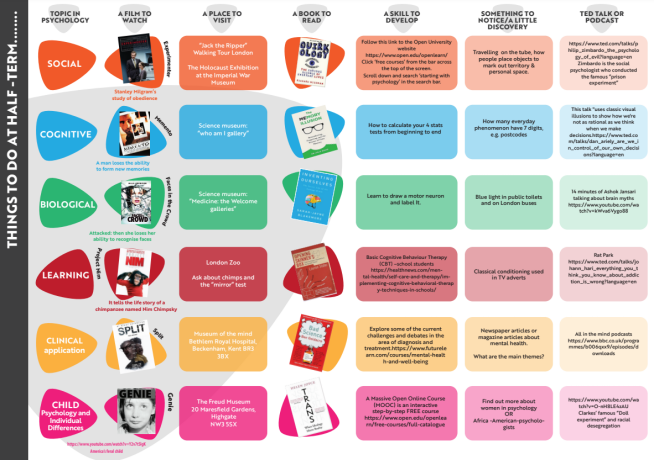
Telephone - 01628 483 752
Company Registration No.07690054
- Welcome
- News & Events
- About Us
- School Life
- Canteen & Catering
- Careers Programme
- Duke of Edinburgh’s Awards
- House System
- Library
- Lockers & Bicycle Racks
- One to One Laptop Scheme
- Parents’ Evenings
- Prefects: Sixth Form & Year 11
- Safeguarding
- School Nurse
- School Transport
- Student Support and SEN
- Teacher Training
- Transition to Year 7
- Uniform, Hair, Jewellery, Phones
- 6th Form
- Curriculum
- Parent & Carers
- Attendance Guide
- Bucks Family Information Service
- Bucks School Transport
- Communication & Catering
- Friends of Great Marlow School
- Information Evenings
- Gift Aid
- Letters Home
- Mental Health Support
- Online Safety Resources
- Parent/Carer Services
- Progress Review Guides
- School Uniform Shops
- Special Educational Needs
- The Voice – School Newsletter
- Student Area
- Sport
- Gallery
Psychology
 ABOUT PSYCHOLOGY
ABOUT PSYCHOLOGY
Psychology is the scientific study of human behaviour, cognition and emotion. Students will gain insights into why people behave differently on their own to when in the company of others, why they forget and how we remember, why feelings impact upon behaviour. The course will look at how these features develop, how they differ across people, how they are wired-up in the brain and how they break down due to illness and injury. Students will need to be willing to have their ideas and opinions challenged and take on board new theories and evidence-based arguments.
Psychology asks students to address thought-provoking questions. To what extent is autism genetic? Can forgetting be explained? Does exposure to violence on TV result in aggressive behaviour?
We are all amateur psychologists, every time we try to work out why someone acted the way they did or try to predict how someone might behave in a given situation. Psychology finds answers to some of these questions by investigating them using scientific research methods.
PSYCHOLOGY AT GREAT MARLOW SCHOOL
WHY STUDY PSYCHOLOGY AT A LEVEL?
Students planning on entering higher education will find psychology invaluable because it sits on the boundary between the arts and the sciences combining elements of both. A-level Psychology enables students to show their competency in scientific thinking, statistical analysis of data, the ability to construct well-argued essays and acquire knowledge from a range of theoretical viewpoints.
A qualification in psychology can pave the way to careers in health and social care professions, sports management, educational diagnostics, journalism, human resources, forensic sciences, research, teaching and others too numerous to mention. Most of all, psychology is the profession of the 21st century.
PSYCHOLOGY AT GREAT MARLOW SCHOOL
PSYCHOLOGY Edexcel Course Codes: 9PSO1, 9PSO2, and 9PSO3
The subject teacher for Psychology is Mrs King. It has a dedicated classroom and a reading area.
Psychology is offered as a two year, linear course. The examination board is Edexcel.
All classes are taught using a variety of teaching methods and styles including group work, independent study, presentations and regular class assessments. Students are offered the opportunity to apply their understanding of scientific enquiry to their own research and experiments, both in and outside the classroom. Candidates are taught how psychological research is conducted, including the role of scientific enquiry and data analysis; they are challenged to apply this to their own ethical scientific enquiries. Some of the work will be as a class, whereas the rest will consist of small group or individual work. Students are expected to be independent in their use of the textbook and appropriate web-links outside direct tuition.
Students will be provided with the details of appropriate textbooks to purchase. The school’s website contains additional learning support for psychology including the Edexcel syllabus components: past papers, exemplar answers and the content of weekly lessons. These are made available to encourage students to optimise their independent learning opportunities to deepen understanding. Across all topic areas, there are articles from a variety of journals and newspaper reports available; they are provided to help further students’ understanding and encourage a thirst for knowledge. The department aims to support students to understand and apply psychology in the real world.
ENTRY REQUIREMENTS
In particular, a good level of English comprehension is essential; students have to grapple with the linguistic complexity of the subject: Level 6 in Mathematics, Science and English is required.
Success in psychology requires competency in scientific thinking and numeracy: students have to demonstrate understanding, using the application of content to scenarios; as well as the ability to construct well-argued essays.
HOW IS THE COURSE ORGANISED?
The course is designed to be completed over two years, with a focus on content in Year 12 and greater emphasis on exam technique in Year 13. There is a 20% maths component, taught through applied practicals.
There is an allocation of eight hours of teaching each fortnight, with the additional opportunity for one hour of weekly supervised study with access to a range of psychology resources within the psychology room.
WHAT WILL I BE STUDYING?
The A-level course comprises four sections completed during Year 12, and a further 3 sections in Year 13 combined with the practical endorsement, which together constitute the full A-level. The sections can be summarised as:
Topics studied in Year 12
Social Psychology: Obedience to authority; prejudice; self-report research methods.
Cognitive Psychology: Theories of memory; case studies of brain damage; dementia; experimental methods.
Biopsychology: Neural structure and function; synaptic transmission; brain structure and function; hormones and aggression; action of recreational drugs in the CNS; use of twins and adoption in research.
Behaviour (Learning) Approach: Theories of conditioning; phobias and therapy; use of animals in research.
Topics studied in Year 13
Clinical Psychology:
- Diagnosis and classification of mental health disorders;
- Genetic and neurochemical explanations of schizophrenia;
- Psychological explanations for anorexia;
- Treatment and therapy for mental health disorders;
- Cultural and gender issues in clinical psychology;
- Ethics and therapy
Child Psychology:
- Attachment in infancy * Effects of deprivation and privation
- Autism * Ethics in research
- Longitudinal studies * Cross cultural research
Synoptic component of the course
- Research Methods
- Statistical data analysis,
- Issues and debates in psychology.
HOW IS THE COURSE ASSESSED?
Candidates sit 3 x 2 hour written examination papers (equally weighted) at the end of the second year of study. The questions require short-answer responses and longer extended writing responses. Up to 25% of the assessment is synoptic, requiring students to synthesise theory from across a range of topics.
Non-Exam Assessment (NEA)
Students’ knowledge of methodology is partially assessed through six practical investigations, completed as part of the course and written in the style of a research report. These are assessed by the teacher as pass or fail and are separate to the overall grade. The examination papers include questions on the six investigations (practicals).
Tracker tests for specific course components take place at regular intervals and help inform subsequent progress reports. Throughout the duration of the course, progress is monitored and support put in place to challenge and enable students achieve their best possible outcome.
Note: Edexcel Psychology A-level, like other examination boards, no longer offer controlled assessments. Students’ knowledge of research methodology is assessed on the practical investigations, outlined above: therefore, the practicals are important as the exam papers may include questions on the six investigations (practicals).
WIDER CURRICULUM
The Wider Curriculum allows students to take a further interest in their subjects and subject related material they study at school. The Wider Curriculum also enables parents and carers to actively engage with the opportunities offered by each department. Each PDF is hyperlinked, so when you click on them, the links will take you to areas where you may read, view, listen, visit and be creative.
CAREERS IN PSYCHOLOGY |
||
| Careers Adviser/Consultant | Health Psychologist | Occupational Psychologist |
| Clinical Psychologist | Healthcare Worker | Psychotherapist |
| Counsellor | Human Resources | Social Worker |
| Counselling Psychologist | Local Government | Sport & Exercise Psychologist |
| Educational Psychologist | Market Researcher | Teacher |
| Forensic Psychologist | Neuropsychologist |

